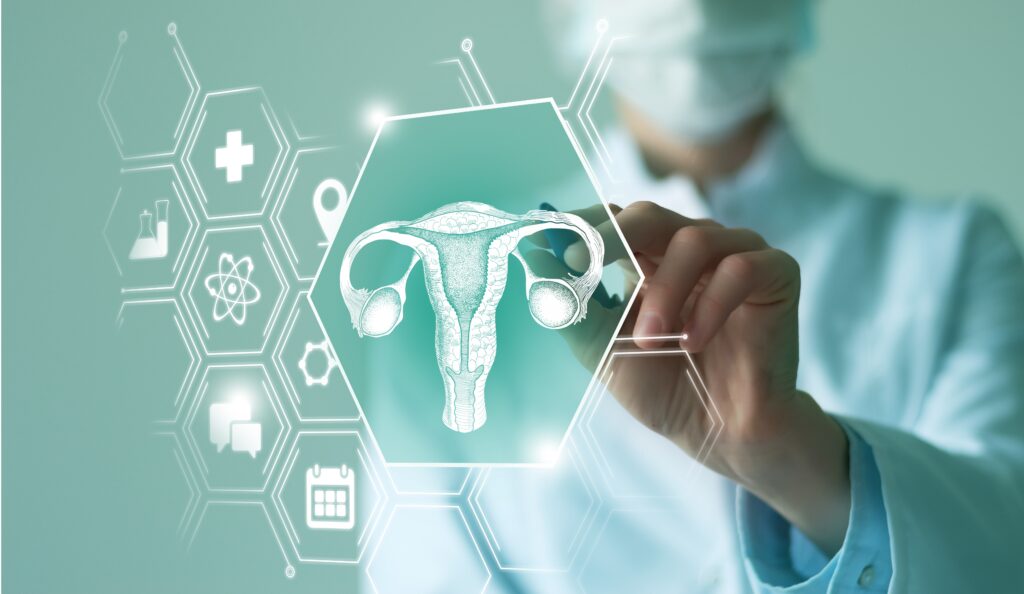January is Cervical Health Awareness Month – a time of year when women’s cervical health is brought to the forefront of people’s minds to help raise awareness of cervical cancer.
At Echelon Health, we want to support awareness of this important condition by informing you of the signs and symptoms associated with cervical cancer. Preventative healthcare is at the heart of everything we do, after all, and we understand just how important it is to recognise the early signs of cervical cancer when trying to protect your cervical health.
In this blog post, we’re going to explain exactly what cervical cancer is, the risk factors that cause its onset and the key signs and symptoms you need to be aware of.
What is cervical cancer?
Cervical cancer begins as cancerous cells in the cervix. When detected early, these can then be treated and progression of cervical cancer can be limited. However, if left undetected or untreated, the cancerous cells can grow and spread.
There are two main types of cervical cancer – squamous cell carcinoma and adenocarcinoma. Most cases of cervical cancer are squamous cell carcinoma.
As with other cancers, there are different stages to cervical cancer. Early-stage cervical cancer is found only in the cervix and can be treated with surgery alone. Other stages may need treatments such as chemotherapy and radiotherapy.
The earlier the stage of cervical cancer is detected, the more effective the treatment will be. However, if the cancerous cells are left to develop and grow, there is a higher likelihood of them turning into a more aggressive stage of cancer.
Causes of cervical cancer
Cervical cancer is caused by the development and spread of cancerous cells in the cervix. However, the main underlying cause of cervical cancer is the human papillomavirus (HPV).
HPV is spread through sexual contact which is why practising safe sex is essential. Vaccines are available for HPV and are very effective at preventing cervical cancer.
Risk factors for cervical cancer
Some women may be at a higher risk of cervical cancer – but this does not mean they are guaranteed to develop it.
The most common risk factors for cervical cancer include:
- Age – cervical cancer is more common in younger women, with most cases being diagnosed between the ages of 30 and 34.
- Other sexually transmitted infections (STIs) – women with chlamydia have a higher risk of developing cervical cancer.
- Smoking – your risk of cervical cancer increases the more cigarettes you smoke per day. It’s never too late to stop and the sooner you can, the better.
- Family history – you may have an increased risk of developing squamous cell carcinoma cervical cancer if your mother, daughter or sister has or had cervical cancer.
- Contraceptive pill – taking the contraceptive pill for more than five years may slightly increase the risk of cervical cancer.
Reducing your risk of cervical cancer as much as possible is vital. Some ways you can reduce your risk are:
- Giving up smoking
- Practising safe sex
- Having an HPV vaccine
- Attending regular cervical screenings
Signs and symptoms of cervical cancer
Early stages of cervical cancer and pre-cancerous cells do not usually cause symptoms, which is why attending regular cervical screenings is essential. Only at these screenings will you be able to detect any abnormal changes in your cervix.
However, some warning signs of cervical cancer can also develop over time, as highlighted below.
Bleeding
Changes to vaginal bleeding are one of the most common signs of cervical cancer, especially if you’re bleeding at times other than during your period.
You may notice bleeding:
- Between your periods
- During or after sex
- After menopause
If you notice bleeding after sex, this isn’t always caused by cervical cancer. In most cases, it is caused by cervical erosion, where cells within the cervix are found on the surface instead. Having sex can then cause this erosion to bleed.
Discomfort or pain during sex
Some women experience pain or discomfort during sex which is called dyspareunia. Although this can be a sign of cervical cancer, it can also be a symptom of other health conditions such as an STI, thrush and menopause.
Other symptoms
Various other symptoms may arise as a result of having cervical cancer. These might include:
- Changes in vaginal discharge – this can sometimes smell unpleasant
- Pain in your pelvis or lower abdomen
Again, these symptoms can also be caused by other health conditions. For example, changes to vaginal discharge can be a result of an STI and pain in your pelvis can occur regularly due to conditions like endometriosis.
This is why you need to attend your cervical screenings as they will be able to detect cancerous cells and abnormalities of the cervix.
Preventing cervical cancer
Cervical cancer is one of the few cancers that can be prevented with a vaccine. However, there may be cases when cervical cancer develops despite following precautions.
The most effective ways to prevent cervical cancer include:
- Cervical screenings – always attend your screenings
- HPV vaccine
- Seeing your doctor if you notice any changes in your vaginal bleeding or discharge
- Never ignore new or worsening symptoms
When it comes to cancer treatment, the sooner it’s diagnosed, the better. Earlier stages of cancer are much easier to treat and have a higher rate of remission.
Book your preventative health assessment with Echelon Health
As cervical cancer does not usually cause early warning signs, having preventative health checks is essential.
At Echelon Health, we offer a wide range of health assessments to help you future-proof your wellbeing. For example, our dedicated female health assessment, The Cullinan Assessment, can detect early signs of disease in women over the age of 40.
If you would like to not only put your cervical health first but also reduce your risk of several other types of cancer, book an appointment with Echelon Health.
Our supportive team of experts will be there every step of the way to ensure you’re comfortable and informed throughout your tests. We’ll also provide comprehensive results that are easy to interpret and provide a clear path for your health journey.
Sources:
- https://www.nhs.uk/conditions/cervical-cancer/
- https://www.cancerresearchuk.org/about-cancer/cervical-cancer/symptoms
- https://www.nhsinform.scot/illnesses-and-conditions/cancer/cancer-types-in-adults/cervical-cancer/
- https://www.nhs.uk/conditions/cervical-cancer/symptoms/
- https://www.macmillan.org.uk/cancer-awareness/cervical-cancer-awareness
- https://www.cancerresearchuk.org/about-cancer/cervical-cancer/stages-types-grades
- https://www.cancerresearchuk.org/about-cancer/cervical-cancer/risks-causes



